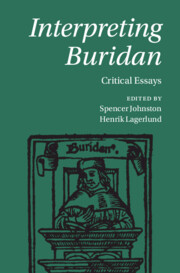
-
Select format
-
- Publisher:
- Cambridge University Press
- Publication date:
- 01 February 2024
- 08 February 2024
- ISBN:
- 9781108992497
- 9781108834247
- 9781108994729
- Dimensions:
- (228 x 152 mm)
- Weight & Pages:
- 0.52kg, 264 Pages
- Dimensions:
- (229 x 152 mm)
- Weight & Pages:
- 0.387kg, 263 Pages
- Subjects:
- Medieval Philosophy, Philosophy
You may already have access via personal or institutional login- Subjects:
- Medieval Philosophy, Philosophy
Book description
John Buridan (d. 1362) is one of the great thinkers of the later Middle Ages. He is perhaps best known for his contributions to logic, but the range of his thought is wide. This volume of new essays, written by leading Buridan scholars, places Buridan in his philosophical context and examines his writings on logic, modal logic, paradoxes, metaphysics, epistemology, and natural philosophy. It also introduces several new topics of discussion that have not so far been dealt with in scholarship on Buridan, such as his theory of knowledge, his view of artefacts, his conception of women, his writing on emotions, and his moral philosophy. Together the essays produce a rich picture of Buridan's thought and underline the continuing relevance of his philosophical concerns.
Contents
Metrics
Full text views
Full text views help Loading metrics...
Loading metrics...
* Views captured on Cambridge Core between #date#. This data will be updated every 24 hours.
Usage data cannot currently be displayed.
Accessibility standard: Unknown
Why this information is here
This section outlines the accessibility features of this content - including support for screen readers, full keyboard navigation and high-contrast display options. This may not be relevant for you.
Accessibility Information
Accessibility compliance for the PDF of this book is currently unknown and may be updated in the future.

